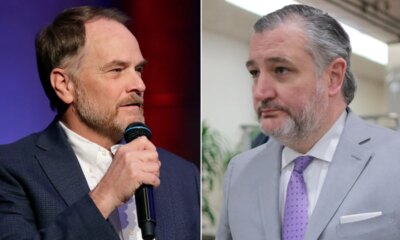Entertainment
Aunjanue Ellis-Taylor knows 'Nickel Boys' is tough. She believes you can handle it

Aunjanue Ellis-Taylor is listening to Louis Armstrong singing “Makin’ Whoopee” on her phone as I slide into a booth at a Telluride hotel restaurant.
It’s not a bad way to start a Sunday morning.
She then opens a Spotify playlist and hits the song that started her day, Ella Fitzgerald and Armstrong’s version of “Autumn in New York,” telling me that she and a friend are planning a fall trip to upstate New York and her pal had sent along some songs to get her in the mood.
Ellis-Taylor and I have bumped into each other a few times over the past couple of days — Telluride is a small festival — and on each occasion, she has been dressed immaculately, wearing a different pair of bold, brightly colored glasses. People told her that Telluride was casual, “all sweatpants,” but she wasn’t about to represent her new movie, “Nickel Boys,” in loungewear. “I’m not playing,” she says, laughing, showing off a gold ring with a serpent design.
“I love it because I’m from Mississippi and snakes abound,” she says.
Ellis-Taylor grew up on her grandmother’s farm in Magnolia, Miss., and it was those roots that led her, indirectly, to “Nickel Boys,” RaMell Ross’ adaptation of Colson Whitehead’s acclaimed novel about the friendship between two Black boys at a brutal Florida reform school in the early 1960s. Ellis-Taylor saw Ross’ 2018 Oscar-nominated documentary “Hale County This Morning, This Evening” and was so impressed by its depiction of the lives of Black people in a disenfranchised Alabama community that she tracked down his phone number at Brown University, where he teaches, and left him a message.
“I went to Brown, so I still knew the switchboard number by heart,” she says. “I don’t know if he ever got my message. I’m sure the person that took it was just like, ‘Lady, I don’t know how you think this works, but it doesn’t work like that.’ But I didn’t care. I just wanted to express my admiration for the work he did.”
Which led her, five years later, to her agreeing to the play the pivotal role of a loving, devoted grandmother in “Nickel Boys,” and to this Telluride restaurant where we spoke for an hour.
Why did you respond so strongly to “Hale County” that, as you joked, you’d go and “stalk” the filmmaker?
I’m fascinated by representations of the South. And in a lot of what I have seen, I haven’t felt seen. I’ve often felt insulted by it because oftentimes it’s caricature work.
Do you still identify as a Southern woman?
Oh, absolutely. To my core. That’s why I responded to RaMell’s work because I felt like I was seeing something that was a real reflection of me and people that I knew. People walking out of trailers and mud puddles outside of trailers, and lives lived in and out of trailer parks. And it’s not being done in a way where it’s being made fun of. It’s not a fishbowl. It’s lived in, invested in. I loved it so much.
Had you read “Nickel Boys” before being offered the part?
I was aware of it, but hadn’t read it. But I did not care what the part was. If it was RaMell Ross, it didn’t matter to me. I have directors like that — people like that in general. I just want to be a part of what they’re doing. Ava [DuVernay] is one of those people. Lee Daniels is another. I just dig what they’re doing. I dig how they think beyond the product of work that they put out there.
Did you circle back to the book? Is reading an adaptation’s source material important to you?
Well, I’m going to be honest with you: I started it, but I didn’t finish it. And I did not finish on purpose. Here’s the reason why: With something like [the 2023 DuVernay movie] “Origin,” I had to be fluent in how Miss [Isabel] Wilkerson thought because I was going to have to act that. So her ideas, her scholarship, could not be something that I learned on the day. It had to be something that I lived with.
“Nickel Boys” is a true story, but it is still someone’s retelling. And I didn’t want to feel obligated to what Colson Whitehead wrote, because I have that kind of brain where I’ll be like, “Why aren’t we adhering to this part of the book?” I wanted to go into it being a part of what RaMell was building with my eyes wide open and just telling the story that he was trying to tell. Because the stories are very different.
How would you explain the differences between the book and the movie?
There’s an approach to the story that could beautifully honor the story Colson Whitehead wrote. And it would be great. It would also be sufficient. We all would think, “That’s what I read.” But what RaMell wants to do, it seems to me, is build something out of the actual narrative that makes it bigger than what happened to those boys in Florida. That it didn’t just happen to them, that there is a tradition of those reform schools all around this country. And it’s a history that we have ignored, that we have not really unearthed and it has not been vindicated.
So what RaMell has done — with braiding in this archival footage — is that you see what happens with these boys, but you also see it framed in the context of what is happening in this country and what has continued to happen in this country. That is what makes this film worth it. When you do that kind of storytelling, audiences come out of it feeling complicit. Because we all are. We all are complicit in what happened to those children.
You told me earlier that you hadn’t seen the movie. Do you find it difficult to watch yourself onscreen?
It’s not just that. You don’t have the luxury of having full belief in everything that you do. Sometimes it’s just work and it pays and I take care of people in my life with it. So I welcome it, and thank you, Jesus, for it. But some things you believe in and you want people to believe in it the way you believe in it. So I’m not seeing this because I don’t want to come and bring my own judgment to it. I don’t want to be affected by opinions, including my own, because I think the brilliance and the value of it should live outside of that. And as soon as I watch it, I become a consumer. And I don’t want to do that. I want to be an agent of it.
So, if you’re watching it in the theater at the premiere, you’re bringing you’re own self-critical judgment.
Exactly. It becomes an immediate critique.
And if people walk out in the middle of the movie — as they do at festivals — it probably gets in your head. I talked with people after the premiere who told me they were challenged by the way the film shifts between the points of views of the two boys and the subjective, impressionistic storytelling. They found “Nickel Boys” hard to watch.
I want to say something about that. I’ve had people that have seen it tell me it’s tough. I think that we have been conditioned as moviegoers, particularly in this country, to have an expectation of how we should feel watching a film. I want to be an advocate for cinema that is not palliative. I think a lot of times, people want to come into a space that is saying: We are unearthing a tragedy, a brutality against American children. But somehow they want to leave that space feeling good.
They want to leave feeling uplifted, not feeling unmoored.
Yes. And that’s unfortunate. “Nickel Boys” is about brutality against American children, so we should feel discomfited. We should feel confounded. Why? Because if we can feel that just for a little bit, then we can have some empathy, real empathy, for what they endured for a lifetime.
You know, people ask me — I don’t want to be indulgent here, but I do want to say this — because I often play real characters and some of them suffer. Isabel Wilkerson suffered greatly in what we captured in “Origin.” And I’ve been asked, “What is that like for you to play someone who’s going through that? What is it like for you to absorb that? How do you decompress?” And my response is, “I’m good. It’s a privilege for me to do that.” When I’m playing suffering Isabel Wilkerson, Ava DuVernay at some point is going to say “cut.” Isabel Wilkerson didn’t have that privilege. The children in those reform schools didn’t have that privilege. What RaMell wants to do in the movie is make us feel just a little bit of what was unbearable to those children.
A lot of what we see of your character in “Nickel Boys” comes through in glimpses. What kind of feeling did you want to bring to these scenes?
Hattie loves Elwood and that love for her grandson comes out her pores. There’s a scene where they’re decorating a Christmas tree and there’s a playfulness between them. Women during that period of time, Black folks during that period of time, there was not a lot of joy and delight in children because there was no time for it. So to see this woman enjoy and delight in her grandson, that was my hope.
What kind of relationship did you have with your grandmother, the woman who raised you?
That wasn’t this. My grandmother was like, “You need to be fed, clothed and you need to go to church and I’m going to take care of you within those parameters.” She loved me, but she didn’t smile at me very much. Hattie smiles at Elwood.
Do you still have family in Mississippi?
My sister lives in Hattiesburg with my niece and nephew. And I still live in Mississippi, though I’m spending a lot of time in Georgia now. I have to have a presence in the South. No matter where I go, I will always have to have that. The South suffered from the Great Migration, and what ended up happening is it just became a haven for Confederates in this country. They have branded themselves a thousand different ways. But that’s still what it is. And because of that exodus, we have not been properly able to fight it. So I gotta stay there. America has a problem, as Beyoncé says. But I’m not giving up.

Movie Reviews
Jeremy Schuetze’s ‘ANACORETA’ (2022) – Movie Review – PopHorror

PopHorror had the chance to check out Anacoreta (2022) ahead of its streaming release! Does this meta-horror flick provide interesting story telling or is it a confusing mess.
Let’s have a look…
Synopsis
A group of friends heads to a secluded woodland cabin for a weekend getaway, planning to film an experimental horror movie. As the shoot progresses, the project begins to fall apart—until a real and terrifying presence emerges from the darkness.
Anacoreta is directed by Jeremy Schuetze. It was written by Jeremy Schuetze and Matt Visser. The film stars Antonia Thomas (Bagman 2024), Jesse Stanley (Raf 2019), Jeremy Schuetze (Jennifer’s Body 2009), and Matt Visser (A Lot Like Christmas 2021)
My Thoughts
Antonia Thomas delivered an outstanding performance as the female lead in Anacoreta. It was remarkable to watch her convey such a wide range of emotions with authenticity and depth. I was continually impressed by her ability to switch seamlessly between different dialects. I absolutely loved her delivery of the dialogue of telling The Scorpion and the Frog fable.
Anacoreta employs a distinctive, meta-horror style of storytelling. The narrative follows a group of friends creating a “scripted reality” horror film, and as the plot unfolds, the boundary between their staged production and their actual lives becomes increasingly blurred. This was interesting, but at the same time frustrating as a viewer.

Check out Anacoreta on Prime Video and let us know your thoughts!
Entertainment
Todd Meadows, ‘Deadliest Catch’ deckhand, dies at 25

Todd Meadows, a crewmember on one of the fishing vessels featured on the long-running reality series “Deadliest Catch,” has died. He was 25.
Rick Shelford, the captain of the Aleutian Lady, announced in a Monday post on Facebook and Instagram that Meadows died Feb. 25. He called it “the most tragic day in the history of the Aleutian Lady on the Bering Sea.”
“We lost our brother,” Shelford wrote in his lengthy tribute. “Todd was the newest member of our crew, he quickly became family. His love for fishing and his strong work ethic earned everyone’s respect right away. His smile was contagious, and the sound of his laughter coming up the wheelhouse stairs or over the deck hailer is something we will carry with us always.
“He worked hard, loved deeply, and brought joy to those around him,” he added. “Todd will forever be part of this boat, this crew, and this brotherhood. Though we lost him far too soon, his legacy will live on through his children and in every memory we carry of him.”
A fundraiser set up in Meadows’ name described the deckhand from Montesano, Wash., as a father to “three amazing little boys” who died “while doing what he loved — crabbing out on Alaskan waters.”
According to the Associated Press, Meadows died after he was reported to have fallen overboard around 170 miles north of Dutch Harbor, Alaska.
“He was recovered unresponsive by the crew approximately ten minutes later,” Chief Petty Officer Travis Magee, a spokesperson with the Coast Guard’s Arctic District, told the AP. The Coast Guard is investigating the incident.
Meadows was a first-year cast member of “Deadliest Catch,” the Discovery Channel reality series that follows crab fishermen navigating the perilous winds and waves of the Bering Sea during the Alaskan king crab and snow crab fishing seasons. The show debuted in 2005. No episodes from Meadows’ season has aired.
Deadline reported that the show was in production on its 22nd season when the incident occurred, with the Shelford-led Aleutian Lady being the last of the vessels still out at sea at the time. Production has subsequently concluded, per the outlet.
“We are deeply saddened by the tragic passing of Todd Meadows,” a Discovery Channel spokesperson said in a statement that has been widely circulated. “This is a devastating loss, and our hearts are with his loved ones, his crewmates, and the entire fishing community during this incredibly difficult time.”
Meadows is the latest among “Deadliest Catch” cast members who have died. Previous deaths include Phil Harris, a captain of one of the ships featured on the show, who died after suffering a stroke while filming the show’s sixth season in 2010. Todd Kochutin, a crew member of the Patricia Lee, died in 2021 from injuries he sustained while aboard the fishing vessel, according to an obituary. Other cast members have died from substance abuse or natural causes.
Movie Reviews
‘Hoppers’ review: Pixar’s best original movie in years

“So it’s like Avatar?” one character quips in Disney and Pixar’s “Hoppers,” bluntly translating the film’s high-concept premise for the sugar-fueled kids in the audience. And yes, the comparison is apt. The story follows a nature-obsessed teenage girl who manages to quite literally “hop” her consciousness into the body of a robotic beaver in order to spark an animal rebellion against a greedy mayor determined to bulldoze their forest for a freeway.
It’s a clever hook. The kind of big, elastic idea Pixar used to make look effortless. “Hoppers” does not reach the rarified air of “Up,” “Wall-E,” or “Inside Out,” but after a stretch of uneven originals like “Turning Red” and “Luca,” and outright misfires such as “Elemental” and “Elio,” this feels like a genuine course correction. The environmental messaging is clear without being preachy, the animals are irresistibly anthropomorphized, and the studio’s once-signature emotional sincerity is back in sturdy form.
Pixar can afford to gamble on originals when it has a guaranteed cash cow like this summer’s “Toy Story 5” waiting in the wings, but “Hoppers” earns its place in the catalogue. Director Daniel Chong crafts a warm, heartfelt film that occasionally strains under the weight of its own ambition, yet remains grounded by character and theme. Its meditation on conservation and animal displacement feels timely in a way that never tips into after-school-special territory.
We meet Mabel, voiced with bright conviction by Piper Curda, as a child liberating her classroom pets and returning them to the wild. Her moral compass is shaped by her grandmother, voiced by Karen Huie, who imparts wisdom about nature’s sanctity. True to both Pixar tradition and the broader Disney playbook, this beacon of guidance does not survive past the opening act. Loss, after all, is Pixar’s favorite inciting incident.
Years later, Mabel is still fighting the good fight, squaring off against the smarmy Mayor Jerry, voiced with slick menace by Jon Hamm. He plans to flatten the glade where Mabel and her grandmother once found solace. Mabel’s resistance feels noble but futile. The animals have already mysteriously vanished, the machinery is coming, and her last-ditch plan involves luring a beaver back to the abandoned forest in hopes of jumpstarting the ecosystem.
That’s when the film gleefully pivots into mad-scientist territory. At Beaverton University, Mabel discovers her professor, voiced by Kathy Najimy, has developed a device that can project human consciousness into synthetic animals. The process, dubbed “hopping,” allows Mabel to inhabit a robotic beaver and infiltrate the forest from within. It’s an inspired escalation that keeps the film buoyant even when the plotting grows predictable.
Her new posse includes King George, a lovably beaver voiced by Bobby Moynihan with distinct Bing Bong energy; a sharp-tongued bear voiced by Melissa Villaseñor; a regal bird king voiced by the late Isiah Whitlock Jr.; and a fish queen voiced by Ego Nwodim. As is often the case with Pixar, even in its lesser efforts, the world-building is meticulous. The animal hierarchy, complete with titles like “paw of the king,” is layered with jokes that play for kids while slyly winking at adults.
The plot ultimately follows a familiar template. Scrappy underdog rallies community. Corporate villain twirls metaphorical mustache. Emotional third-act sacrifice looms. At times, you can feel the machinery working a little too cleanly. Pixar, and Disney at large, has grown increasingly reliant on sequels and established IP, and “Hoppers” does not radically reinvent the wheel. In an animated landscape where films like “K-Pop: Demon Hunters,” “Across the Spider-Verse,” and “Goat” are pushing stylistic and narrative boundaries, being safe and sturdy may not always be enough.
And yet, there is something refreshing about a Pixar original that remembers how to tug at the heart without squeezing it dry. “Hoppers” is playful, peppered with cheeky needle drops, and builds to a sweet emotional catharsis that may or may not have left this critic a little misty-eyed. It feels earnest and engaged.
“Hoppers” may not be top-tier Pixar. But it is a welcome return to form, a reminder that the studio still knows how to marry big ideas with a bigger heart.
HOPPERS opens in theaters Friday, March 6th.
-

 World6 days ago
World6 days agoExclusive: DeepSeek withholds latest AI model from US chipmakers including Nvidia, sources say
-

 Massachusetts7 days ago
Massachusetts7 days agoMother and daughter injured in Taunton house explosion
-

 Denver, CO7 days ago
Denver, CO7 days ago10 acres charred, 5 injured in Thornton grass fire, evacuation orders lifted
-

 Louisiana1 week ago
Louisiana1 week agoWildfire near Gum Swamp Road in Livingston Parish now under control; more than 200 acres burned
-

 Oregon5 days ago
Oregon5 days ago2026 OSAA Oregon Wrestling State Championship Results And Brackets – FloWrestling
-

 Florida3 days ago
Florida3 days agoFlorida man rescued after being stuck in shoulder-deep mud for days
-

 Maryland3 days ago
Maryland3 days agoAM showers Sunday in Maryland
-

 Culture1 week ago
Culture1 week agoTry This Quiz on Thrilling Books That Became Popular Movies



















